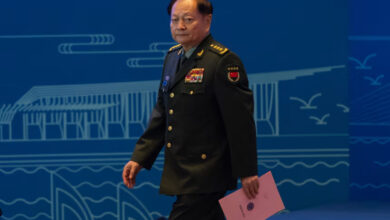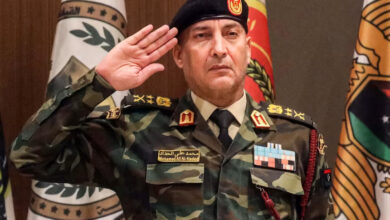After about a year during which more than 12,000 Egyptians were tried in military courts and activists waged a relentless campaign against military justice for civilians, the ruling military council seems to have dropped the practice. At least for now.
The number civilians transferred to military courts has decreased significantly in recent months as almost all detainees from the clashes in and around Tahrir Square between protesters and security forces in November and December are being interrogated by the civil prosecution. At the same time, the Maspero case, which was originally investigated by the military prosecution, has been transferred to a civilian judge.
“I consider it a victory for the movement, as we launched a vicious campaign that succeeded in turning the words ‘military trials’ into a hated one in public opinion,” said Mona Seif, a founder of the No to Military Trials for Civilians movement.
It seems the movement has been successful in pressuring the ruling military junta to hold back on transferring more civilians and political activists to military tribunals, but human rights activists say it’s too soon to start celebrating a human rights victory yet. The dropping of military trials was merely a reaction to street pressure and provides no legal guarantee in the future, which means they could be resumed soon, activists say.
Leading the seemingly successful charge against military trials has been the group No to Military Trials for Civilians, an unofficial collection of activists, lawyers and journalists who teamed up after the military violently dispersed a sit-in in Tahrir Square on 9 March and transferred activists to military courts. Since then, the group has been advocating for the rights of civilians to be tried before civilian judges.
The campaign organized protests around Cairo and Alexandria and outside the Military Court during trial sessions. Members distributed flyers and bright yellow stickers with “No to military trials” written on them, which later became a hallmark of the campaign. (The stickers can be spotted on streets, cars, bags, laptops, and even, occasionally, police vehicles.) Lawyers from the group have been providing legal assistance to prisoners in military trials. The group also documented the military’s human rights violations and released the information to social and traditional media.
They created a hotline on which they receive calls from families of people transferred to military trials or who were subject to any human rights abuse. As a result, the campaign has gained the attention of mainstream media, as they were invited by some private TV channels to talk about their work.
There is no updated record of the number of civilians tried in military courts since 28 January. However, the latest official number was announced four months ago by General Adel al-Morsy, head of the Military Judiciary Authority. According to Morsy, the military court has ruled on 3,863 cases between 28 January and 29 August, in which about 12,000 civilians were tried.
The first case that originally brought attention to military trials for civilians was that of 32-year-old Amr El Behery, who was badly beaten and arrested along with nine other protesters by military forces at a sit-in at the cabinet on 25 February. Behery was sentenced by a secret military court to five years in prison on charges of breaking the military-imposed curfew and assaulting a public employee. The court didn’t notify his family of the trial and didn’t allow him to appoint a lawyer to represent him in court. Since then, thousands of others have suffered fates similar to that of Beheiry.
The other case that triggered activists’ anger was that of Maikel Nabil, who was sentenced to three years in prison by a secret military court in April after he wrote blog post criticizing the army. A retrial in December reduced the sentence to two years.
But in recent months, the pace of military trials for civilians has significantly slackened. During the violence between army soldiers and protesters late last month, only three protesters were sent to the military prosecution. Two people were released pending investigations and the third is still in custody, accused of assaulting military personnel, according to Maha Maamoun, the lawyer representing them.
That is a marked difference from previous army attacks on protests. Military forces arrested and tried 120 protesters from a Tahrir sit-in that was disbursed on 9 March; their sentences were later suspended. Another 45 protesters arrested at a protest on the anniversary of the Palestinian Nakba on 15 May also received suspended sentences from a military court.
Military trials were used in both political and criminal cases up until the clashes that took place between protesters and security forces outside the Israeli Embassy in Cairo in September. Since then, military trials have targeted political activists and revolutionaries, said Seif.
The military’s change in tactics came after an escalation in the No Military Trials for Civilians campaign, which urged people to boycott the military judiciary and to not cooperate with the military prosecution following the detention of prominent blogger and activist Alaa Abd El Fattah in what has become known as the Maspero case.
When summoned by the military prosecution for interrogation, Abd El Fattah refused to answer the prosecutors’ questions in protest at military trials for civilians. The Maspero case, in which 28 people are suspects, was later transferred to the general prosecutor, and finally to an investigation judge to ensure an independent investigation.
Seif, however, doubts the intentions of the ruling Supreme Council of the Armed Forces (SCAF).
“Not transferring new cases to the military court doesn’t mean they [the SCAF] learned their lesson. They realized that using military trials will backfire on them, but they are shifting now to new twisted strategies,” Seif told Egypt Independent.
“Military forces now arrest protesters, torture them and then hand them to the civil prosecution. This is in addition to the recurrent kidnappings of activists by anonymous people.”
Furthermore, many of those convicted by military courts since April and May are still awaiting their sentences to be approved by Major General Hassan al-Roweiny, Central Command Chief and SCAF member. Until an approval is issued, lawyers can’t file an appeal. Martial law states that the head of the Central Command has to approve any sentences issued by a military court before they are enacted.
Heba Morayef, an Egyptian researcher with Human Rights Watch, shares Seif’s fears.
“If you ask me whether the Egyptian citizen is now guaranteed more protection in terms of a fair trial, I will say no, as long as there are still extraordinary trials for civilians,” said Morayef. “The SCAF has been giving meaningless concessions for months only because of public pressure. But they didn’t offer anything genuine, especially because State Security trials that rule by Emergency Law are still standing, but they don’t replace military trials.”
According to the human rights researcher, both military and State Security trials represent an extraordinary and blatant violation of human rights.
Both the Emergency Law and martial law are used to legitimize trying civilians before military tribunals.
Article 5 (a) in Chapter 2 of the Military Justice Code No 25/1966 states that the provisions of the law are enforced on anyone who commits a crime in any place where armed forces personnel are deployed.
Since the military forces were heavily deployed on the streets starting 28 January, anyone who broke the law in any way was arrested and tried in a military court. More recently, military forces have largely vanished from the street and been replaced by police, which could provide an alternate explanation for the fewer military trials.
Article 48 of the same law also states that the Military Judicial Authority is the sole body with power to decide on whether an alleged offense is within its jurisdiction.
In addition, Article 6 (2) of the Emergency Law gives the president the power to transfer crimes punishable by the Penal Code to military courts.
The military junta wants to retain the sole authority to amend the Martial Law, as evidenced by the supra-constitutional principles put forward by in SCAF in November, which included articles giving the military exclusive right to amend its laws.
Seif said that the No Military Trials for Civilians movement will focus its campaign in the coming period on requesting that those sentenced to jail by military trials be retried before civilian judges. The group will also pressure the newly elected parliament to draft amendments to the Martial Law, though that is expected to face resistance from the SCAF.
Morayef agrees that this is an important direction in which to channel energy. “Nothing will be changed unless both Emergency and Martial law are amended,” she said.
The No Military Trials for Civilians campaign has already proved that it is capable of enacting real change. Those behind the movement hope that they can bring about further changes in the future.




